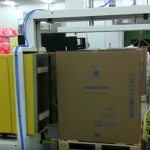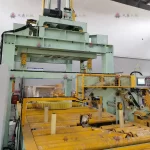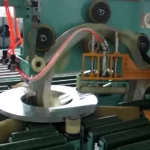Ensuring compliance and safety in industrial settings is no longer just a matter of meeting legal requirements; it’s about protecting workers, maintaining product quality, and building trust with customers and stakeholders. For industries handling metal coils, cables, or other cylindrical products, one of the most overlooked yet crucial tools for achieving these goals is the coil wrapping machine. These machines are not only designed to streamline packaging processes but also play an essential role in adhering to the increasingly stringent safety and compliance standards set by regulatory bodies.
From preventing damage to heavy, unwieldy coils to reducing workplace accidents, coil wrapping machines have become an indispensable part of modern industrial operations. But their significance goes far beyond automation. They ensure that packaging meets the legal requirements for transport and storage while also minimizing risks to workers who handle these large and often hazardous loads. On top of that, these machines contribute to sustainability efforts by optimizing material usage and reducing waste.
The question is, how exactly do coil wrapping machines help industries meet compliance and safety standards? While the answer depends on the specific needs of your operation, one thing is clear: these machines are not just a convenience but a critical investment for companies committed to adhering to regulations, protecting their workforce, and maintaining product integrity.
[Claim] Choosing the right coil wrapping machine is a strategic decision that can have a far-reaching impact on compliance, safety, and operational efficiency. In this guide, I’ll explore the ways these machines support regulatory compliance and workplace safety while offering practical insights to help you make the best choice for your business.
Table of Contents
- How Do Coil Wrapping Machines Address Safety Concerns?
- 1.1 Reducing Workplace Hazards Through Automation
- 1.2 Enhancing Ergonomics and Worker Well-Being
- 1.3 Minimizing Risks of Product Damage
- What Role Do Coil Wrapping Machines Play in Regulatory Compliance?
- 2.1 Meeting Packaging and Transportation Standards
- 2.2 Ensuring Consistency in Packaging Quality
- 2.3 Supporting Sustainability and Material Efficiency
- How to Choose the Right Coil Wrapping Machine for Your Operation?
- 3.1 Assessing Your Specific Needs and Priorities
- 3.2 Evaluating the Available Technologies
- 3.3 Balancing Cost, Efficiency, and Compliance
- What Are the Long-Term Benefits of Investing in Coil Wrapping Machines?
- 4.1 Increased Productivity and Cost Savings
- 4.2 Enhanced Reputation with Customers and Regulators
- 4.3 Future-Proofing Your Operations Against Regulatory Changes
1. How Do Coil Wrapping Machines Address Safety Concerns?
1.1 Reducing Workplace Hazards Through Automation
Handling large, heavy coils manually is inherently risky. These items are often bulky, difficult to stabilize, and prone to causing injuries when improperly handled. This is where coil wrapping machines become invaluable. By automating the packaging process, these machines significantly reduce the amount of physical labor required, minimizing the risks associated with lifting, stabilizing, and securing heavy coils.
For instance, traditional manual wrapping processes often involve workers operating in close proximity to hazardous machinery or unstable loads. Coil wrapping machines eliminate the need for such hands-on involvement by enclosing the coil in protective wrapping materials with precision. This automation not only ensures a safer working environment but also reduces the likelihood of accidents caused by human error or fatigue.
Moreover, many modern coil wrapping machines are equipped with advanced safety features, such as emergency stop buttons, protective barriers, and sensors that detect anomalies in the wrapping process. These features ensure that both the machine operator and nearby workers are protected from potential hazards, further enhancing workplace safety.
1.2 Enhancing Ergonomics and Worker Well-Being
Repetitive tasks like manually wrapping coils can take a toll on workers’ physical health. Over time, such activities can lead to musculoskeletal disorders, fatigue, and other ergonomic issues. Coil wrapping machines address these concerns by automating repetitive motions, allowing workers to focus on less physically demanding tasks.
For example, instead of manually rotating a coil or bending repeatedly to secure wrapping material, operators can simply load the coil onto the machine and let it handle the rest. This shift not only improves efficiency but also reduces workplace injuries related to strain and repetitive motion.
In addition, many machines are designed with user-friendly interfaces and ergonomic loading mechanisms, further supporting worker comfort. By investing in equipment that prioritizes well-being, businesses can cultivate a healthier and more productive workforce while reducing absenteeism and turnover caused by work-related injuries.
1.3 Minimizing Risks of Product Damage
Safety isn’t just about protecting workers—it’s also about safeguarding the product itself. Improperly wrapped coils are more susceptible to damage during transport and storage, which can lead to costly losses and potential compliance violations. Coil wrapping machines ensure that products are securely and uniformly packaged, reducing the risk of scratches, dents, or corrosion caused by exposure to external elements.
This level of precision is particularly important for industries like steel, aluminum, and cable manufacturing, where product quality is paramount. For instance, a coil that arrives at its destination damaged not only impacts the bottom line but can also lead to legal liabilities if it fails to meet the specifications agreed upon with the customer. By using a coil wrapping machine, businesses can ensure that every product is packaged to the highest standards, minimizing risks and maintaining customer trust.
In summary, coil wrapping machines are indispensable for addressing safety concerns in industrial operations. They reduce workplace hazards, enhance ergonomics, and protect products from damage, creating a safer and more efficient working environment. But the benefits don’t stop there—these machines also play a critical role in helping businesses meet regulatory compliance, as I’ll explore in the next section.
2. What Role Do Coil Wrapping Machines Play in Regulatory Compliance?
2.1 Meeting Packaging and Transportation Standards
In today’s globalized economy, products are often shipped across countries or continents, each with its own set of regulations. For industries handling coils—be it steel, aluminum, or cables—compliance with packaging and transportation standards is non-negotiable. Improperly packaged coils can result in costly fines, rejected shipments, or even legal action if damage occurs during transit. This is where coil wrapping machines become essential.
Coil wrapping machines are engineered to meet the specific requirements for packaging standards across industries. For example, they ensure that coils are tightly wrapped in protective materials, such as stretch film, VCI (Volatile Corrosion Inhibitor) film, or bubble wrap, to safeguard them from moisture, dust, and physical impact. This not only meets regulatory guidelines for safe transport but also ensures that products arrive in pristine condition, ready for use or further processing.
Additionally, many regulatory bodies require clear labeling and secure packaging to avoid hazards during loading and unloading. Advanced coil wrapping machines often come with integrated labeling systems, allowing manufacturers to add crucial information like weight, dimensions, and safety warnings directly onto the packaging. By automating these processes, businesses can ensure full compliance with national and international shipping regulations.
2.2 Ensuring Consistency in Packaging Quality
One of the hallmarks of regulatory compliance is consistency. Whether you’re wrapping 10 coils or 1,000, each package must meet the same high standards to avoid penalties or customer dissatisfaction. Manual wrapping, while cost-effective for small-scale operations, often falls short in delivering this level of uniformity. Variations in tension, overlapping, or material usage can lead to uneven packaging, increasing the risk of non-compliance.
Coil wrapping machines eliminate this variability by standardizing the wrapping process. With programmable settings and automated controls, these machines ensure that each coil is wrapped with the same precision and care. For example, you can set the machine to apply a specific number of wrapping layers or adjust the tension to match the product’s size and weight. This consistency not only meets compliance requirements but also reinforces your brand’s reputation for quality and reliability.
Moreover, uniform packaging helps streamline inspections by regulatory authorities. When your products are consistently wrapped to meet industry standards, inspections become faster and less likely to result in delays or disputes. This level of predictability is invaluable for businesses operating in highly regulated industries, where even minor deviations can have significant consequences.
2.3 Supporting Sustainability and Material Efficiency
In recent years, environmental regulations have become a critical part of compliance for manufacturers. Governments and industry bodies are increasingly pushing for sustainable practices, including the reduction of packaging waste and the use of recyclable materials. Coil wrapping machines can play a key role in helping businesses meet these environmental standards.
First, these machines are designed to optimize material usage. Unlike manual processes, where excessive wrapping is common, automated machines apply just the right amount of material needed to secure the coil. This reduces waste and lowers costs while ensuring that the product remains fully protected.
Second, many modern coil wrapping machines are compatible with eco-friendly materials, such as biodegradable films or recycled plastics. By incorporating these materials into your packaging process, you can meet sustainability goals and comply with regulations aimed at reducing environmental impact.
Finally, sustainability isn’t just about materials—it’s also about energy efficiency. Many advanced coil wrapping machines are built with energy-saving technologies, such as variable-speed motors and automatic shutoff features. These innovations reduce energy consumption, helping businesses achieve compliance with energy efficiency standards while also lowering operational costs.
By meeting packaging, transportation, and environmental regulations, coil wrapping machines enable businesses to navigate the complex landscape of compliance with confidence. But their advantages extend beyond meeting legal requirements—they also help businesses operate more efficiently and responsibly, as I’ll discuss in the next section.
3. How to Choose the Right Coil Wrapping Machine for Your Operation?
3.1 Assessing Your Specific Needs and Priorities
The first step in choosing the right coil wrapping machine is understanding your operation’s unique requirements. Not all coil wrapping machines are created equal, and selecting the wrong one can lead to inefficiencies, higher costs, or even compliance risks. Start by asking yourself a few key questions:
- What types of coils do you handle? (e.g., steel, aluminum, copper, or cables)
- What is the average size and weight of the coils you need to wrap?
- How many coils do you process daily, weekly, or monthly?
- Do you need to use specific wrapping materials to meet industry standards?
Answering these questions will give you a clear picture of your needs, allowing you to narrow down your options. For example, if you handle large, heavy coils in a high-volume operation, you might need a fully automated machine with heavy-duty capabilities. Conversely, if your operation is smaller or more specialized, a semi-automatic or manual machine could be sufficient.
It’s also important to consider your long-term goals. Are you looking to improve worker safety, reduce waste, or enhance compliance with specific regulations? By aligning your priorities with the features of the machine, you can ensure that your investment delivers measurable benefits over time.
3.2 Evaluating the Available Technologies
Once you’ve identified your needs, it’s time to explore the technologies available in coil wrapping machines. Modern machines come with a wide range of features designed to improve efficiency, safety, and compliance. Some of the most important features to look for include:
- Programmable Controls: Machines with customizable settings allow you to adjust wrapping tension, speed, and material usage for different coil sizes.
- Material Compatibility: Ensure the machine can handle the wrapping materials you need to meet compliance or sustainability goals.
- Safety Features: Look for machines with sensors, emergency stops, and protective barriers to ensure worker safety.
- Integration Capabilities: If you’re aiming for a fully automated workflow, consider machines that can integrate with conveyor systems or warehouse management software.
By evaluating these technologies, you can choose a machine that not only meets your current needs but also adapts to future changes in your operation.
3.3 Balancing Cost, Efficiency, and Compliance
While cost is always a factor in any purchasing decision, it’s important to look beyond the initial price tag. A cheaper machine might save you money upfront but could end up costing more in the long run if it fails to meet your efficiency or compliance requirements. Similarly, an expensive machine with unnecessary features might not deliver the ROI you’re looking for.
The key is to strike a balance between cost, efficiency, and compliance. Consider the total cost of ownership, including maintenance, energy consumption, and material usage. Compare this to the potential benefits, such as reduced labor costs, improved safety, and enhanced compliance with regulatory standards.
By taking a holistic approach to your decision, you can ensure that the coil wrapping machine you choose is a smart investment that supports both your operational and compliance goals.
4. What Are the Long-Term Benefits of Investing in Coil Wrapping Machines?
4.1 Increased Productivity and Cost Savings
One of the most immediate and long-term benefits of investing in a coil wrapping machine is the increase in productivity it brings to your operations. Automating the packaging process eliminates the bottlenecks caused by manual labor, enabling faster and more efficient handling of coils. For businesses processing hundreds or thousands of coils on a regular basis, the time saved with automated or semi-automated machines can translate directly into greater throughput and higher revenue.
Additionally, coil wrapping machines help you optimize material usage. By applying the exact amount of wrapping material needed for each coil, these machines reduce waste and cut down on packaging costs. Over time, this efficiency not only supports sustainability goals but also results in significant cost savings.
Consider the cumulative effect of these benefits: a machine that wraps coils faster, reduces waste, and minimizes errors will pay for itself within a few years, if not sooner. Furthermore, by freeing up your workforce to focus on other tasks, you can allocate resources more effectively, boosting overall operational efficiency.
4.2 Enhanced Reputation with Customers and Regulators
In today’s competitive marketplace, reputation is everything. Customers expect high-quality products that arrive safely and comply with industry standards, while regulators demand adherence to increasingly stringent guidelines. Investing in a coil wrapping machine demonstrates your commitment to both.
For customers, consistently well-packaged coils are a sign of professionalism and reliability. Damaged or poorly wrapped products, on the other hand, can lead to dissatisfaction, returns, and even loss of business. By ensuring that every coil is securely and uniformly wrapped, you can build trust with your customers and strengthen your reputation in the industry.
For regulators, compliance is non-negotiable. A coil wrapping machine ensures that your packaging meets the necessary safety, transportation, and environmental standards, reducing the risk of penalties or legal disputes. This proactive approach to compliance not only protects your business but also positions you as a responsible and forward-thinking company.
4.3 Future-Proofing Your Operations Against Regulatory Changes
Regulations are constantly evolving, particularly in areas like workplace safety, environmental protection, and international trade. Businesses that rely on outdated or manual processes often struggle to adapt to these changes, leading to higher compliance costs and operational disruptions.
Coil wrapping machines, particularly those with advanced features, offer the flexibility needed to future-proof your operations. For example, machines equipped with programmable settings can be easily adjusted to meet new packaging or labeling requirements. Similarly, machines compatible with eco-friendly materials allow you to stay ahead of sustainability regulations without the need for costly upgrades.
By investing in modern coil wrapping technology, you’re not just solving today’s challenges—you’re also preparing your business for the demands of tomorrow. This long-term perspective can save you money, reduce stress, and give you a competitive edge in an ever-changing regulatory landscape.
Conclusion
[Claim] Coil wrapping machines are far more than just tools for packaging—they are strategic assets that enable businesses to meet compliance and safety standards while improving efficiency and reducing costs.
From reducing workplace hazards and improving ergonomics to ensuring regulatory compliance and enhancing customer satisfaction, the benefits of these machines are both immediate and long-lasting. Automated systems, in particular, offer unparalleled consistency and precision, making them invaluable for businesses handling high volumes of coils or operating in highly regulated industries.
However, choosing the right coil wrapping machine requires careful consideration. By assessing your operational needs, evaluating available technologies, and balancing cost with long-term value, you can make an informed decision that supports your business’s goals. Whether you prioritize safety, compliance, sustainability, or efficiency, there’s a coil wrapping machine that aligns with your priorities.
Ultimately, investing in a coil wrapping machine is more than just a way to meet today’s standards—it’s a forward-thinking solution that positions your business for growth, resilience, and success in the future. By recognizing the critical role these machines play in compliance and safety, you’re not just protecting your workforce and products—you’re building a stronger, smarter operation that’s ready to thrive in an increasingly demanding world.








